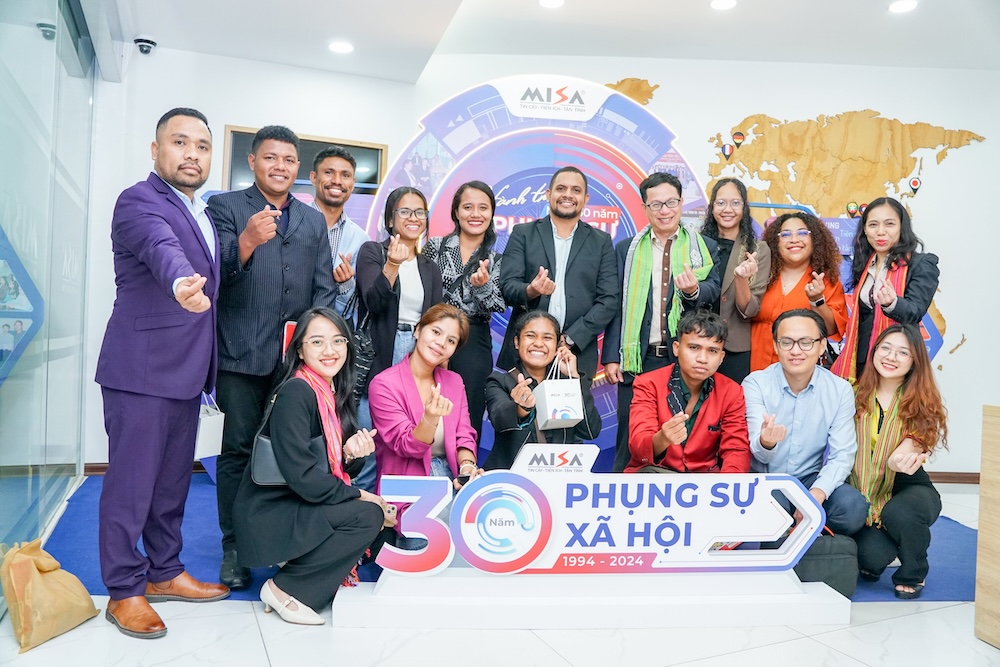Vietnam turns semiconductor vision into action
The global semiconductor industry is being reshaped by geopolitical tensions, shifting supply chains, and the surge of digital technologies.




The young leader of East Timor emphasizes that Vietnam has a lot of development experience that East Timorese businesses can learn and cooperate with.
A delegation of future leaders of East Timor under the framework of the Future Leaders Program for ASEAN recently carried out the Vietnam immersion visit.
The purpose of program is to develop leaders who understand ASEAN as a region, get exposure to ASEAN member states and work with institutions in the public and private sector.
This will help Timor-Leste be ASEAN-capable and ASEAN-ready by the expected date for full membership.
TheLEADER had a short conversation with Nuno Ridenio, CEO of NR Unip LdaI, head of the delegation, about some results of the program and expectations for cooperation in the future.

Can you share some outcomes of the trip to Vietnam? Did it fulfill your expectations before you went to Vietnam?
Nuno Ridenio: Before we came here, we had meetings and training programs where we wrote down our expectations for the visit to Vietnam. After eight days of working, the outcomes really exceeded what we expected.
For example, when visiting Vietnamese companies and organizations, we hoped they would talk about the ways of running a business.
In fact, they also shared many other personal things. There were really open conversations. They were open to talk to us about their company culture, how they build their business models, and what they are doing to deal with complaints and other issues.
So, what experiences did you personally learn from those stories?
Nuno Ridenio: Sure, I learned a lot from the visit. When coming to enterprises, I observed the way they do their work and gained experience for myself.
I think that the team and our partners really filled in the gaps and found some similarities, even though we are from different backgrounds, education, and working environments.
When I was immersed in Vietnam, I found it so interesting that the working culture in Vietnam is very direct. They go straight to the topic rather than going around the agenda.
Our team also met a lot of teachers from whom we could learn a lot about adapting to the current situation, like digitalization.

What are your impressions of the Vietnamese business environment and legal framework for enterprises after some meetings? Did you learn anything from these talks?
Nuno Ridenio: Vietnam and Timor share a lot of similarities. Our government has also been helping small enterprises to grow for the past 5-6 years. Timor is also in a golden age period, with a large population between 18-35 years old.
The difference is the policy. I am very impressed that the Vietnamese government does what they say. When they say they want to help enterprises grow, they really do and put effort into it. That's something I learned from here as well, and maybe our government can learn too.
Another thing we want to learn more about is the technology that Vietnam is now very good at. I really hope our country will have the same level of technology one day.
I met a software company, MISA, and they shared their intention to work together as well. I will see more because our entrepreneurial ecosystem is not as good as Vietnam’s.
Do you have any recommendations for the younger generation of leaders?
Nuno Ridenio: We really need to adapt to what's happening, not only inside but also outside our own country, especially in digitalization and the transformation to digitalization.
I really want to highlight that young people need to learn more to adapt to a world with constant changes. Education, technology, and entrepreneurship are important, helping create more startups and boosting economic growth.
What are your recommendations to boost the connection of the youth in the two countries and in the ASEAN region?
Nuno Ridenio: Exchange programs like what we are doing are a good chance to gain a better understanding of other countries and establish connections with other young entrepreneurs, which will become business opportunities in the future.
I think we should have more programs like this, and there should be more exchange programs in specific fields such as education, technology, or business so that more young leaders in ASEAN can join and share their stories.
The global semiconductor industry is being reshaped by geopolitical tensions, shifting supply chains, and the surge of digital technologies.
The change in APA approval authority is expected to shorten processing time and enhance business proactiveness in international tax negotiations.
As hybrid cloud systems grow more complex, Vietnamese enterprises are struggling to detect cybersecurity threats moving laterally within their own networks.
The submission of the draft resolution on Vietnam’s international financial center to the National Assembly heralds a new developmental era for the country.
More than just running a 5-star resort, Kristian Petersen is redefining the art of hospitality with a humane and sustainable leadership philosophy.
For Tyna Huynh, co-founder of Drinkizz, organic is not just a food choice but a way of life that fosters a deep connection between people, nature and community.